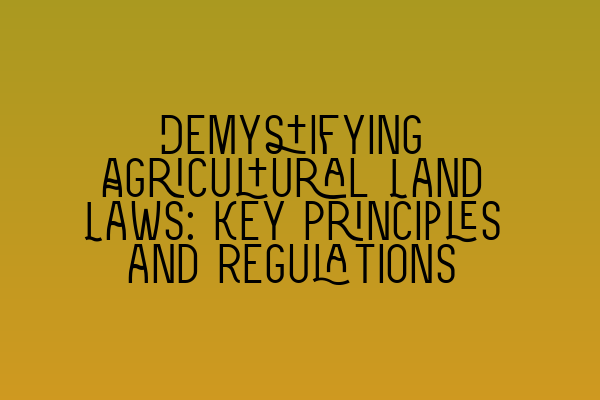Demystifying Agricultural Land Laws: Key Principles and Regulations
If you are involved in the agricultural industry, whether as a farmer, landowner, or investor, understanding the principles and regulations governing agricultural land is crucial. Agricultural land laws help protect the interests of farmers, ensure the sustainability of agricultural practices, and promote responsible land management.
In this blog post, we will demystify agricultural land laws by exploring key principles and regulations that govern this specialized area. We will cover topics such as land ownership, use of agricultural land, land development, and environmental considerations. So, let’s delve into the world of agricultural land laws and gain a better understanding of its significance.
1. Land Ownership and Tenure:
One of the fundamental aspects of agricultural land laws is the concept of land ownership and tenure. Agricultural land can be owned by individuals, families, corporations, or the government. Understanding the different types of ownership, such as freehold, leasehold, or common land, is crucial for navigating legal processes related to agricultural land transactions.
If you are considering purchasing agricultural land, it is important to consult with a property law expert to ensure that you are aware of any restrictions, easements, or rights of way that may affect your use of the land. It is also crucial to consider any tenancy agreements, as agricultural land may be subject to existing leases or licenses.
To gain a deeper understanding of land ownership and tenure in the context of agricultural land, you can refer to this related article on the SQE Property Law & Land Law website: SQE 1 Practice Exam Questions.
2. Land Use and Agricultural Activities:
Agricultural land laws govern the use of agricultural land for farming and related activities. These laws aim to promote sustainable agricultural practices, protect the environment, and ensure food security. Agricultural land can only be used for agricultural purposes unless specific planning permissions or exemptions are obtained.
Agricultural land laws also regulate activities such as livestock rearing, crop cultivation, horticulture, and forestry. Compliance with regulations is important to avoid potential penalties or legal disputes. It is essential to familiarize yourself with local zoning regulations, government grants, and subsidies available for agricultural activities.
For comprehensive coverage of land use regulations and guidance on agricultural activities, you can refer to this related article on the SQE Property Law & Land Law website: SQE 1 Practice Mocks FLK1 FLK2.
3. Land Development and Planning Permissions:
Agricultural land may be subject to development opportunities, such as the construction of farm buildings, renewable energy projects, or agricultural diversification. However, these developments require proper planning permissions and compliance with local planning regulations.
The laws surrounding land development and planning permissions aim to balance the needs of agricultural development with environmental protection and sustainable land use. It is essential to understand the planning process, consult with relevant authorities, and seek legal advice to navigate through these complexities successfully.
To gain a more comprehensive understanding of land development regulations and the planning process, you can refer to this related article on the SQE Property Law & Land Law website: SQE 2 Preparation Courses.
4. Environmental Considerations:
Agricultural land laws prioritize the protection and preservation of the environment, wildlife, and biodiversity. Farmers and landowners must comply with regulations concerning pollution prevention, land management, water resources, and conservation.
Understanding environmental considerations is crucial for adhering to regulations, avoiding fines, and preserving the long-term sustainability of agricultural land. Farmers should be aware of environmental impact assessments, soil protection strategies, and waste management requirements applicable to agricultural activities.
For detailed information on environmental regulations and best practices in agricultural land management, you can refer to this related article on the SQE Property Law & Land Law website: SQE 1 Preparation Courses.
In conclusion, agricultural land laws play a vital role in regulating the ownership, use, development, and environmental impact of agricultural land. Familiarizing yourself with key principles and regulations is essential for farmers, landowners, and investors involved in the agricultural industry. Seeking legal advice from experts in property law can help navigate through complex legal processes and ensure compliance with the law.
To stay updated with the latest developments, legal precedents, and SRA SQE exam dates related to agricultural land laws, you can visit the SQE Property Law & Land Law website: SRA SQE Exam Dates.
Remember, by understanding and complying with agricultural land laws, you can contribute to a sustainable future, protect your interests, and promote responsible land management in the agricultural sector.
